Outlook The
JULY/AUG
VOLUME 73
ISSUE 4
72 YEARS: 1951 – 2023 reformedfellowship.net
2023 DEDICATED TO THE EXPOSITION AND DEFENSE OF THE REFORMED FAITH
GOD CALLED
THE DRY LAND “EARTH,” AND THE GATHERING OF THE WATERS
HE CALLED “ SEAS ” AND GOD SAW THAT IT WAS GOOD . –GENESIS 1:10

Woman Soldier
The Freedom of Embracing Total Depravity
Pupils of Christ
Reformed Theology and Distinguishing Kingdoms
Reflections on the 10 Commandments
In Memoriam: Gaylord Haan
We Are Both Right Good Question
The Problem of Evil
How Can We Satisfy
God’s Justice?
Church Order Articles 9 and 10
The Weekly Day of Rest
Preparing Your Family for the Preached Word Book Reviews
God’s Quickening Travelers
THEN GOD SAID, “LET THE EARTH SPROUT
VEGETATION , PLANTS YIELDING SEED
–GENESIS 1:11

3 | Woman Soldier Mrs. Annemarieke Ryskamp

How we women are to be soldiers for Christ also.
17 | In Memoriam:
Gaylord James Haan
(July 1, 1935–April 21, 2023)
Rev. Jerome Julien
4 | The Freedom of Embracing Total Depravity
Mrs. Elisabeth Bloechl
How can embracing the doctrine of total depravity unveil the lies of legalism and free us to love God and neighbor?.

7 | Pupils of Christ: The Walloon Articles of 1693 (2)
Mr. Michael Kearney
A reader encouraged me to follow up on the topic I introduced in the March/April issue of The Outlook—the five Walloon or Walcheren Articles of 1693. I focused on the first article, but what about the other four?
18
|
We Are Both Right
Mrs. Vanessa Le
As we are fully convinced of our perspective, we will find occasions where we rebuke our Christian brothers and sisters. As we rebuke them, let’s make sure to do so with grace and humility, recognizing in them the treasure that Jesus sees, while praying for their and our sanctification.
20
|
Good Question Series
Rev. William Boekestein
Does it matter that God made people good?
25
|
Church Order Articles
9 and 10
Rev. Greg Lubbers
Article 9: A Lifetime of Service. Article 10: Support and Emeritation of Ministers.
28
|
The Weekly Day of Rest

Rev. Peter Holtvluwer
Why did God create a seventh day? Was this the Sabbath? What was his purpose in making it holy and blessing it? Does this day still apply to Christians today?
10 | Reformed Theology and Distinguishing Kingdoms

Rev. Shane Lems
Making distinctions in doctrine is one aspect of confessional Reformed theology that helps it avoid error and capture biblical nuances. In this article, Pastor Lems summarizes the historic Reformed teaching of distinguishing God’s kingdoms.

21
|
The Problem of Evil (4)
Rev. William Boekestein
Heidelberg Catechism, Lord’s Day 4, Q&A 9, 10, and 11.

23 |
How Can We Satisfy God’s Justice? (5)
Rev. William Boekestein
13 |
Reflections on the 10 Commandments (2)
Mr. Gaylord Haan
In addition to worshiping and fearing God, we are also called to serve God in our daily relationships with our fellow man.
Heidelberg Catechism, Lord’s Day 5, Q&A 12, 14, and 15.
Cover layout/design concept/ composition by Jeff Steenholdt. Images: Unsplash
31
|
Preparing Your Family for the Preached Word (1)
Dr. Joel R. Beeke
This is the first of three articles on an important subject: how parents should train their children to get the most out of public worship, focusing particularly on sermons.
34
|
Book Reviews
Mrs. Vanessa Le
The Ten Commandments for Children and A Hearer of God’s Word.
36
|
God’s Quickening

Mr. Cornelius VanKempen
Death in Adam, Life in Christ.
38 |
Travelers
Editor
Can others see that we are travelers? Can they see that we are strangers and pilgrims on earth and followers of Jesus?
Contents | July/August | Volume 73 | Issue 4
The Outlook | 2
Woman Soldier
In 2 Timothy 2:3–6 Paul gives three examples for Timothy to follow. The first one is in verses 3 and 4: “Join with me in suffering, like a good soldier of Christ Jesus. No one serving as a soldier gets entangled in civilian affairs, but rather tries to please his commanding officer” (New International Version).

I would like to point out a few ways that these verses are applicable to us women just as much as they are to men.
One Body
Just like a soldier is separated from other people by his uniform and living in barracks and altogether living a life separated from the civilian world, all Christians (not just women) should be too. We live in the world but are not of the world. So when the call to battle comes, we should not be so stuck in our everyday lives that we choose to be left behind.
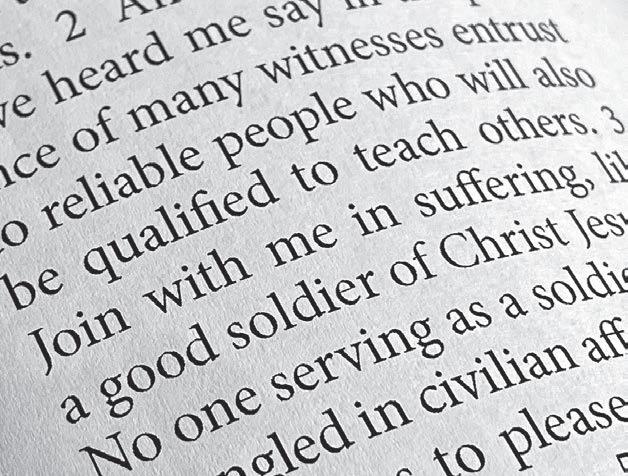
Military people have a civilian life as well. They get married, raise families, and deal with the joys and hardships outside of their military duty. The difference is that they are at all times prepared to go to war. Their weapons are cleaned and ready; their uniforms
or battle gear can be put on in a moment’s notice.
This is how we should live: prepared for spiritual war at all times. At any time something may come up in our lives where we will need to defend our faith or fight in a spiritual struggle. We better be read up and prayed up in order to be ready when the call comes.
Soldiers are part of a regiment. They never have to fight all by themselves. As a group they listen to the commands of their Commander (think Jesus) and obey him in everything. They have trained together, and they know how to stay together and support each other on the battlefield.
So we ladies work on staying together, as a family, as a congregation, as a community. We make sure we are prepared for many unexpected circumstances and know how to defend each other and our children when the time of battle comes. No War?
Soldiers (and we) are not always marching to war. There are quiet
 Mrs. Annemarieke Ryskamp
Mrs. Annemarieke Ryskamp
was born and raised in the Netherlands and graduated with a master’s degree in Dutch language and literature from Utrecht University. She attends Dutton United Reformed Church (MI), where she leads various Bible study groups.

times when mundane tasks ask all of our attention. Soldiers need to keep their area in the barracks white-glove clean, their uniforms spotless, their beds made just so, and their weapons cleaned and ready to be used at any time. Why do they do this? To please their commanding officer. Even when they have a migraine headache or are grieving because they lost a loved one, they follow the rules and stand at attention when the commanding officer enters their barracks.
So why do we do all those mundane tasks and do them at all times? Also to please our commanding officer, who is Christ Jesus. We have him at the forefront of our minds always. And the major happy difference from a human commanding officer is the fact that Jesus is always there to help us, support us, comfort us, and be with us. He is only a (brief) prayer away, and his loving presence is with us at all times, ready to bless us.
Charles Spurgeon says it best: “You are as much serving God in looking after your own children, training them up in God’s fear, minding the house, and making your household a church for God as you would be if you had been called to lead an army to battle for the Lord of hosts.”
It’s a tremendous task, ladies, but let’s go for it. To please our Commander!
July/August 2023 | 3
Getting What I Deserve
It was the same discussion we had many times before. He argued for God’s goodness and our utter depravity. As a good Calvinist, I couldn’t deny either. So my frustration mounted. “I know God is good and that I am wicked in myself. But to say that even my best and good deeds are—without Christ’s merit—no better than filthy rags seems a little extreme. Can’t I just get a little credit? Does all of the glory and praise have to go to God?” We always wound our way to the same answer: God both gets and deserves all the glory while we—of ourselves—deserve only hell. Though I accepted this truth, I was not satisfied with it. There always remained a grain of anger and confusion. How could God claim for himself any and all good in me? What I didn’t realize then was that my anger stemmed from pride, rooted in legalism. What I didn’t realize was the freedom that comes from embracing these truths.


Many of us house legalistic tendencies in our hearts, living them out, without realizing it. This legalism leads to pride, mistrust of God, and despising of neighbor. But what exactly is legalism and how does embracing the truth of total depravity free us from its poisonous effects? It is my aim to answer these questions that we may not end up angry and confused as I was for so long.
What Is Legalism?
Sinclair Ferguson defines legalism as “a peculiar kind of submission to God’s law, something that no longer feels the personal divine touch in the rule it submits to” (italics in original).1 This definition requires some unpacking. First, we need to understand the law. The Bible teaches that God gave us the law to teach us to love as Christ did (thus fulfilling the law) (Whole Christ, 119). He did so because he is our God and Redeemer (see WSC, answer 44). In other words, the law is a good gift from a God who voluntarily united himself to us in covenant love and gave us the tools to love him out of the love he freely gave to us. Contrarily, a legalist views the law as a set of rules given by God to teach us how to earn his favor. He operates under the assumption that God’s love is conditional upon his fulfilling the law’s demands—and that he is able to do so. Or as Ferguson wrote, “Legalism begins to manifest itself when we view God’s law as a contract with conditions to be fulfilled and not as the implications of a covenant graciously given to us” (Whole Christ, 115).
This may sound rather heady and academically removed from real life. What does legalism look like in the everyday man or woman’s life? If you are searching your own heart, how can you determine if what you find is legalism or something else? There are a few telltale signs that legalism has roots in your heart—even if you are a believer. Ferguson writes, “The instinct to [look down on another person] is one of the most obvious telltale
The Outlook | 4
signs of a heart from which legalism has not yet been fully or finally banished; for it implies that we have merited grace more than another” (Whole Christ,124). Another sign is anger. Timothy Keller describes the anger and motivation behind it well: “When your life doesn’t go as you want, you aren’t just sorrowful but deeply angry and bitter. [Legalists] believe that if they live a good life they should get a good life, that God owes them a smooth road if they try very hard to live up to standards.”2 Other signs include jealousy, coveting, or fear-based motivation to obey. The legalist acts out of joyless fear because he thinks of God as an avenging Judge, rather than a compassionate friend (Whole Christ, 128). Legalism taints our view of God, the law, and ourselves. The doctrine of total depravity corrects our vision.
Understanding the Doctrine of Total Depravity
Legalism thrives on the false belief that we can, in some way, merit God’s favor—thereby earning salvation—by following laws (mostly of our own making). The doctrine of total depravity flies in the face of this belief. Total depravity is the doctrine that stems from the truth of original sin: we fell with Adam and are, therefore, born into an estate of sin and misery. We exchanged our holiness and happiness for sin and misery; “the glory of the incorruptible God” and the “truth of God” for “the lie” (Rom. 1:23–26, New King James Version). We exchanged our ability not to sin with the inability to do anything other than sin3 Like a full bathtub
into which a vial of ink is spilled, every part of our being is tainted by sin (Machen). In sum, as a result of original sin, “we sin because we are sinners, born with a nature enslaved to sin.”4
Total depravity, then “signifies a corruption of our moral and spiritual nature that is total in principle, although not in degree (for no one is a bad as he or she might be)” (Study Bible, 781). Here is where total depravity specifically undermines legalism’s lie. For, given our slavery to sin and the corruption of our nature, we are utterly unable to earn God’s favor. To do so would require (in part) perfectly keeping God’s law. However, as slaves to sin (which is breaking God’s law), we are constantly doing the opposite (see Rom. 3:9–23). Indeed, even our good deeds are no better than filthy rags (Isa. 64:6). To believe otherwise
is to be self-deceived. The doctrine of total depravity turns on the lights, showing us that the only thing we have earned is God’s wrath, curse, misery, death, and hell (WSC, question and answer 19). For man “hath wholly lost all ability of will to any spiritual good accompanying salvation; so as a natural man, being altogether averse from that good, and dead in sin, is not able by his own strength to convert himself, or to prepare himself thereunto” (WC IX.3). Into the dark reality of total depravity, God speaks.
Living in the Freedom of the Gospel
The Westminster Shorter Catechism question 20 asks: “Did God leave all mankind to perish in that estate of sin and misery?” The answer of a legalistic heart is No, God did not leave us to perish because we are able, through law keeping, to earn his favor. Contrarily, the catechism answers: “God, having out of his mere good pleasure, from all eternity, elected some to everlasting life, did enter into a covenant of grace to deliver them out of the estate of sin and misery, and to bring them into an estate of salvation by a Redeemer.” That is the beauty of the gospel. God exchanged our unrighteousness and condemnation with Jesus’ righteousness and commendation which “was constituted by His entire life of obedience and His wrath-embracing sacrifice on the cross, where He was made a sin offering.”5
Where we deserved death, Jesus gave us his life (Rom. 5:6–8). Where we deserve God’s wrath, Jesus drank the cup of God’s wrath for us (Jer. 25:15; Luke 22:42). Where even our best deeds are tainted with sin,
• • • July/August 2023 | 5
Total depravity is the doctrine that stems from the truth of original sin: we fell with Adam and are, therefore, born into an estate of sin and misery. We exchanged our holiness and happiness for sin and misery....We exchanged our ability not to sin with the inability to do anything other than sin.
Jesus clothes us with his righteousness (Isa. 64:6; Rom. 8:3). “But God, being rich in mercy, because of the great love with which he loved us, even when we were dead in our trespasses, made us alive together with Christ—by grace you have been saved” (Eph. 2:4, English Standard Version). “He saved us, not because of works done by us in righteousness, but according to his own mercy, by the washing of regeneration and renewal of the Holy Spirit” (Titus 3:5, italics added). This is the great exchange. And “in response to the great exchange that has been accomplished for us in Christ, there is an exchange accomplished in us by the Spirit: unbelief gives way to faith, rebellion is exchanged for trust” (Christ Alone, 42). Out of this faith and trust, we can walk no longer as slaves but as free.
The more we embrace the twin truths of our total depravity and the rich and free gift of salvation from Christ, the more peace and freedom we will know. For, when we realize that all we truly deserve is God’s wrath, God’s rescuing, redeeming, and remaking us will leave us with nothing but gratitude. When we realize “all is of God; the only thing of my very own which I contribute to my redemption is the sin from which I need to be redeemed” (Christ Alone, 42), we can do naught else but praise he who surrendered all for a wretched sinner. With hearts freed from the

curse of the law, made new through the work of the Holy Spirit and overflowing with gratitude, we will desire to keep God’s good law as a means of better loving him and neighbor. Rather than proudly prattling about how much money we donate each year, we will cheerfully give because all has been given to us. Rather than tossing and turning at night, wondering if we measure up as a spouse, parent, or employee, we will sleep
soundly knowing that Christ has cleansed our works and forgiven our failures. Rather than blowing up when things don’t go our way, we will learn to give thanks in all circumstances knowing we deserve hell but have been given heaven.
Rock of Ages, cleft for me, Let me hide myself in Thee; Let the water and the blood, From Thy wounded side which flowed, Be of sin the double cure, Save from wrath and make me pure.
Not the labor of my hands Can fulfill Thy law’s demands; Could my zeal no respite know, Could my tears forever flow, All for sin could not atone; Thou must save, and Thou alone.
Nothing in my hand I bring, Simply to Thy cross I cling; Naked, come to Thee for dress; Helpless, look to Thee for grace; Foul, I to the fountain fly; Wash me, Savior, or I die.
While I draw this fleeting breath, When my eyes shall close in death, When I rise to worlds unknown, And behold Thee on Thy throne, Rock of Ages, cleft for me, Let me hide myself in Thee.
I rejoice that God has given me eyes to begin to see how great my sin and how much greater his salvation. I pray he would open the eyes of our hearts more and more: replacing the lies of legalism with the glorious truths of his full and free salvation from our total depravity. May the words of this great hymn seal these truths to your heart.
1 Sinclair Ferguson, The Whole Christ: Legalism, Antinomianism, and Gospel Assurance—Why the Marrow Controversy Still Matters (Wheaton, IL: Crossway, 2016), 83.
2 Timothy Keller, Prodigal God: Recovering the Heart of the Christian Faith (New York: Riverhead Books, 2008), 56–57.
3 John Hendryx, “Not Able Not to Sin,” May 26, 2017, Monergism, https://www.monergism.com/blog/ not-able-not-sin.
4 “Original Sin and Total Depravity,” in The Reformation Study Bible: English Standard Version, ed. R. C. Sproul (Orlando: Ligonier Ministries, 2005), 781.
5 Sinclair B. Ferguson, In Christ Alone: Living the Gospel-Centered Life (Orlando: Reformation Trust Publishing, 2007), 41.
a member of Orthodox Presbyterian Church Hammond, is a house cleaner and aspiring writer in Griffith, IN.
 Mrs. Elisabeth Bloechl
Mrs. Elisabeth Bloechl
The Outlook | 6
Augustus Toplady, “Rock of Ages” (1776)
Pupils of Christ: The Walloon Articles of 1693 (2)
Areader encouraged me to follow up on the topic I introduced in the March/April issue of The Outlook—the five Walloon or Walcheren Articles of 1693. I focused on the first article, but what about the other four?
Before answering that question, I offer a confession that suggests why this document continues to hold importance for Reformed churches in the twenty-first century. I am writing these words while representing Reformed Fellowship at the Go & Teach Conference in Jordan Station, Ontario. The conference topic is biblical sexuality, a specific area of contention in our historical moment closely tied to deeper disagreements concerning identity. Conference speakers are noting the need for thoughtful engagement with history and philosophy in order for Christians to understand the origins and implications of prevailing ideas about sexuality and human identity today. The discussion includes thoughtful works such as Carl R. Trueman’s The Rise and Triumph of the Modern Self and Christopher J. Gordon’s New Reformation Catechism on Human Sexuality 1 The Walloon Articles, like these more recent writings, point toward the church’s continuing responsibility to speak clearly and reflectively during moments of philosophical and theological dispute.
The dispute engulfing Reformed churches at the end of the seventeenth century involved a wide variety of philosophical perspectives that can be broadly gathered under the umbrella of Enlightenment/rationalist thinking. A primary figure associated with these movements was the French philosopher René Descartes (1596–1650). The members of Classis Walcheren perceived that Descartes’s commitment to rationalism held potentially disastrous consequences for the faith of Christians.2 The Walloon Articles offer five variations on a theme, the theme of submitting theological and philosophical disputes to the Word of God. The first article deals most directly with the theme of subjecting human reason to the Scriptures; Articles 2–5 offer a

representative sampling of responses to related issues arising from a misunderstanding of this relationship.
Synopsis of Walloon Articles 2–5
The four remaining Walloon Articles address doctrines of the Trinity (Article 2), justification (Article 3), the imputation of Adam’s sin (Article 4), and the works of the good and evil angels (Article 5). Article 2 responds to rationalist teachings that argued “that there is no eternal generation, nor can there be, that the person of the son of God became a Son and was generated in time, and that only because God in his gracious providence so willed it.”3 The rationalists sought to identify a more
 Mr. Michael R. Kearney
Mr. Michael R. Kearney
July/August 2023 | 7
Portrait of René Descartes by Frans Hals (1582/1583–1666)
logically defensible view of the Trinity, but the authors of the Walloon Articles stressed the need to maintain a biblical confession surrounding the distinct functions and names of the members of the Godhead, even though doctrines like “eternal generation” surpass our comprehension.
Article 3 deals with the issue of justification, stating that this teaching concerns “the foundations of our blessed Reformation” and connecting it to relevant passages in the Heidelberg Catechism and the Belgic Confession.4 This article does not specify particular sources of controversy regarding justification, but it makes five affirmations. First, no moral works can be a source of our righteousness before God. Second, justification is a form of grace distinct from sanctification and glorification. Third, justification stems from the satisfaction of God’s justice brought about through the active and passive obedience of Jesus Christ. Fourth, this justification is ours through imputation, in which we are “clothed with this robe of righteousness, ‘even as if we in our own person had done it.’”5 Fifth, true faith is the instrument through which we receive this imputed righteousness. Classis Walcheren cited “the Fathers [and] the Word of God” as authorities, upholding these points as the accepted teaching concerning justification and resisting alternative interpretations.6
Article 4 considers the issue of imputation directly. This article contends against those who try to make a separation between the innate depravity of human nature and the specific imputation of Adam’s guilt. Adam’s fall impacted all his descendants not just in a general sense of lasting effects on the world, but specifically because we all “were ‘as children’ in the loins of ‘the common father.’”7 We essentially share in Adam’s violation of God’s
supreme majesty, as well as adding to our own guilt every day. But, “for our comfort,” the article emphasizes that this imputation of Adam’s sin stands over against the imputation of Christ’s righteousness.8 Our comfort stems from recognizing that as we have shared in the disobedience of Adam, so we share in the obedience of Christ, and his righteousness speaks a better word than the word of condemnation imputed to us through our Adamic nature.
Article 5 concerns the works of the good and evil angels. This article recounts biblical and confessional teachings about angels: created spiritual beings, some of whom have been preserved in their original state and minister to believers, others of whom have fallen by God’s permission and their own wickedness. While they await final condemnation, these fallen angels or demons exert their power against the church and its members, being given a varying amount of freedom in various places and times under God’s sovereign providence. Their judgment is sure, and God will not allow them to do anything to the ultimate harm of the elect. The Walloon Articles warn Christians not to deny or downplay the existence of demons, but rather to be “pupils of Christ.”9 As pupils, believers bear responsibility to learn what God’s Word teaches about these enemies and how we should always trust our heavenly Father to provide us with the complete victory. This closing article references Article 13 of the Belgic Confession, which presents a fitting summary of the overall message of the Walloon Articles: We do not wish to inquire with undue curiosity into what [God] does that surpasses human understanding and is beyond our ability to comprehend. But in all humility and reverence we adore the just judgments of God, which are hidden from
us, being content to be Christ’s disciples, so as to learn only what he shows us in his Word, without going beyond those limits. 10
The Philosophical Legacy of Descartes
Having summarized the five Walloon Articles, I would now like to discuss why these articles matter today. Put simply, they matter because Descartes and the philosophy he espoused have mattered tremendously in the history of the Christian church since the eighteenth century.
Descartes rooted his philosophy in a solitary self, disconnected from a world of belonging and doubting everything except the very act of thinking. By centering human identity upon an individual’s ability to reason, Descartes split mind from body, directly undermining the premise of the Heidelberg Catechism that we “belong body and soul” to Jesus Christ, the center of the Scriptures. Cartesian philosophy took hold throughout the West, and as its consequences have intensified over the decades and centuries, it has been increasingly opposed by religious as well as secular philosophers.
Descartes’s philosophy contends that we are each free to define ourselves as we think or feel best—an issue that brings us back to the theme of biblical sexuality in the twentyfirst century. Once we split mind and body in pursuit of some ideal of abstract reason, statements like “I am a woman trapped in a man’s body” cease to be surprising. The authors of the Walloon Articles discerned this progression; one gets the impression that if they were to travel through time and meet a contemporary person struggling with issues of gender identity, they would be troubled, but not surprised. With their thoughtful writing, these church leaders anticipated much of the serious philosophical strife
The Outlook | 8
that Cartesian thinking has yielded centuries later.
Confessions as Historical Signposts
The particular insight of the Walloon Articles also points toward a general observation about the church’s responsibility to speak into issues that emerge in the historical moment. Historically, the church has spoken through creeds and confessions: careful and deliberate statements that clarify and apply Christian teaching. These doctrinal statements emerge at specific moments in history, reflecting particular sets of emerging challenges. And this raises a question for Reformed Fellowship and the church at large: If the historical context is always changing, how can the Reformed faith speak into those changes in an unchanging way?
The work of Ronald C. Arnett on religious communication is helpful here. Arnett describes faith positions in terms of narrative, historicality, and metaphor.11 Narrative offers a story that justifies meaningful practices for a given group of people over multiple generations. Historicality acknowledges that the world changes, sometimes not to our liking. Metaphor, understood as a communicative phenomenon than carries a richer meaning than a mere “idea” or “concept,” allows us to make creative applications of an unchanging narrative into a changing historical moment.
Let me illustrate, borrowing one of Arnett’s examples. Consider a parent and a child. Parental love is the narrative that binds father/ mother and son/daughter together.
The metaphors of “infant,” “toddler,” “young person,” and “adult” guide that narrative as it responds to the historicality of a child’s growth. One’s parenting must adjust to the changing needs of a child in order to remain faithful to the consistent narrative of parental love. Permanence and change dwell together in what Arnett calls a “unity of contraries.”12
The same thoughtful engagement with permanence and change confronts the confessional Reformed tradition. Reformed Fellowship is one example of a Christian association born in the midst of a changing historical moment. As our context continues to change, the issues and needs confronting Reformed Fellowship shift as well, requiring thoughtful and timely responses. Paradoxically, our specific purpose requires regular adjustment in order to remain faithful to our overarching mission of upholding the Reformed faith.
That’s why documents like the Walloon Articles offer so much help today. While these confessional statements do not hold the same authority as the Scriptures, they present “metaphors” that apply those Scriptures to the needs of a particular historical moment. Though not confessionally binding, these documents give us historic precedent for the importance of contemporary statements like Gordon’s New Reformation Catechism. Such statements point beyond themselves, allowing us to continue applying the unchanging story of the Christian faith communicated in the Scriptures to an ever-changing historical moment that desperately needs it.
1 Carl R. Trueman, The Rise and Triumph of the Modern Self: Cultural Amnesia, Expressive Individualism, and the Road to Sexual Revolution (Wheaton, IL: Crossway, 2020); Christopher J. Gordon, New Reformation Catechism on Human Sexuality (Greenville, SC: Gospel Reformation Network, 2022).
2 For historical context, see Roelf Christiaan Janssen, By This Our Subscription: Confessional Subscription in the Dutch Reformed Tradition Since 1816 (Kampen: Theologische Universiteit van de Gereformeerde Kerken in Nederland, 2009), 40–41. The most renowned contemporary opponent of Descartes was Gisbertus Voetius (1589–1676). See Willem J. van Asselt, Introduction to Reformed Scholasticism, trans. Albert Gootjes (Grand Rapids: Reformation Heritage Books, 2011).
3 P. Biesterveld and H. H. Kuyper, Ecclesiastical Manual, including the decisions of the Netherlands Synods and other significant matters relating to the government of the churches, trans. Richard R. DeRidder (Grand Rapids: Calvin Theological Seminary, 1982), 222.
4 Ibid., 223.
5 Ibid., 224. The reference is to Heidelberg Catechism, Lord’s Day 23, question and answer 60.
6 Ibid., 224.
7 Ibid. The reference is to the Compendium of Christian Doctrine (an abridged form of the Heidelberg Catechism), question and answer 11. See The Psalter, with doctrinal standards, liturgy, Church Order, and added chorale section (Grand Rapids: Eerdmans, for the Netherlands Reformed Congregations, 1991), back matter, 90.
8 Biesterveld and Kuyper, 225.
9 Ibid., 226.
10 I am quoting the URCNA translation of the Belgic Confession.
11 Ronald C. Arnett, “Interpersonal Praxis: The Interplay of Religious Narrative, Historicality, and Metaphor,” Journal of Communication & Religion 21, no. 2 (1998): 141–63.
12 Ronald C. Arnett, Communication and Community: Implications of Martin Buber’s Dialogue (Carbondale: Southern Illinois University Press, 1986), 95.
is a board member of Reformed Fellowship. He is pursuing a Ph.D. in Rhetoric at Duquesne University in Pittsburgh.
Mr. Michael R. Kearney
July/August 2023 | 9
Metaphor, understood as a communicative phenomenon that carries a richer meaning than a mere “idea” or “concept,” allows us to make creative applications of an unchanging narrative into a changing historical moment.
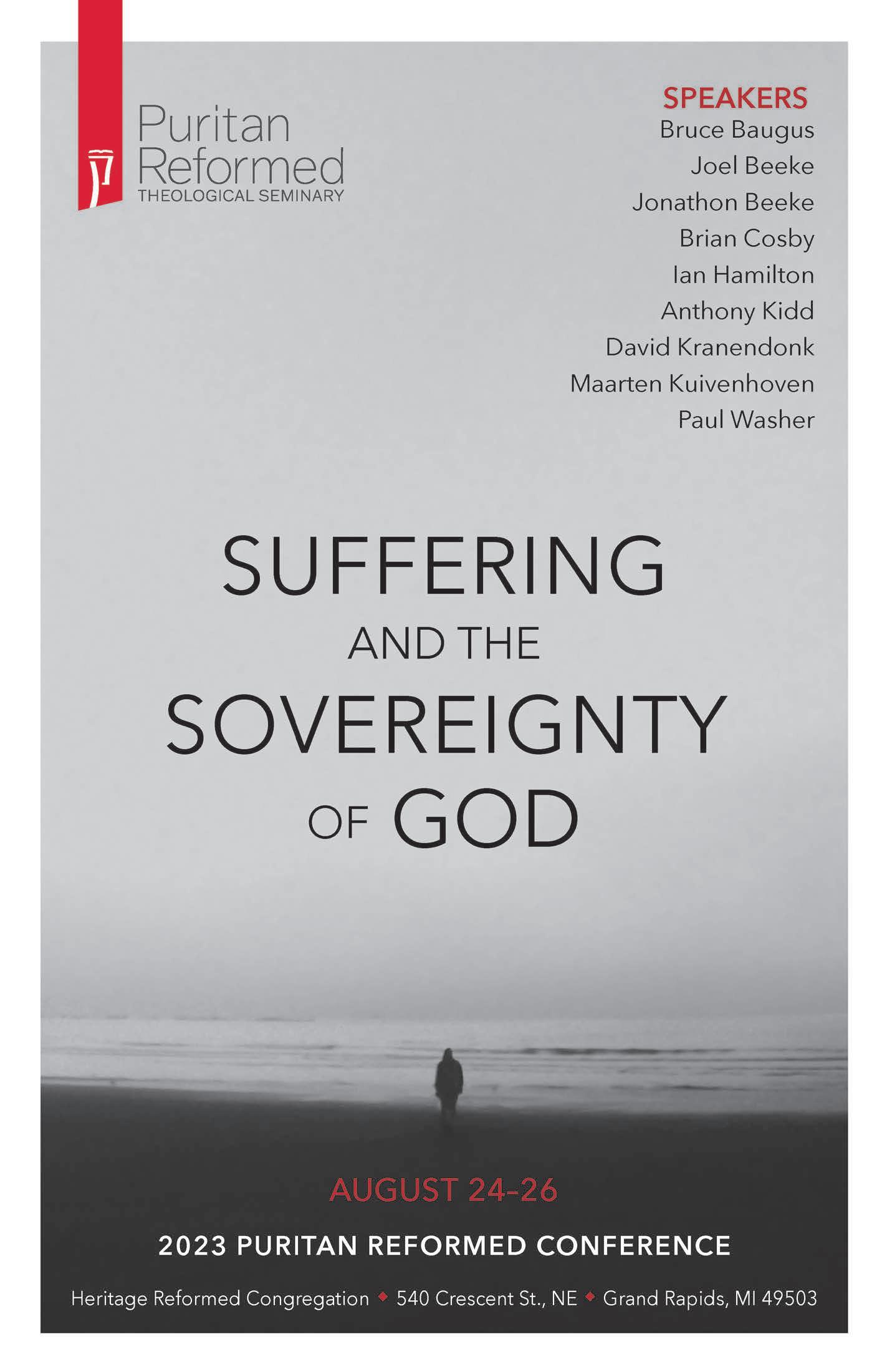
Send all copy to:
Editor, Dan Van Dyke
3718 Earle S.W. Grandville, Michigan 49418
Email: djvan1951@gmail.com
Website: www.reformedfellowship.net
Board of Trustees
Al Rumph, President; Rev. Casey Freswick, Vice President; Rev. Doug Barnes, Secretary; Rev. Andrew Compton, Vice-all; Glenn Hop, Michael Kearney, Tom Kooienga, Dr. Daniel Ragusa, Rev. Mark Vander Hart, David Vander Meer, and John Velthouse, Directors
Editor: Dan Van Dyke
Contributing Editor: Dr. Cornelis P. Venema
General Manager: Hope Staal
Manager's Assistant: Emily Postma
Art, Design & Production: Jeff Steenholdt
This periodical is owned and published by Reformed Fellowship, Inc., a religious and strictly non-profit organization composed of a group of Christian believers who hold to the biblical Reformed faith. Its purpose is to advocate and propagate this faith, to nurture those who seek to live in obedience to it, to give sharpened expression to it, to stimulate the doctrinal sensitivities of those who profess it, to promote the spiritual welfare and purity of the Reformed churches and to encourage Christian action.
The publishers of this journal express their adherence to the Calvinistic creeds as formulated in the Belgic Confession, the Heidelberg Catechism, the Canons of Dort, and the Westminster Confession and Catechisms.
In 1618–1619, an international gathering of theologians, ministers, and elders met to deal with a number of pressing issues in the Reformed church, including translating the Bible, organizing and governing the Reformed churches in the Netherlands, and—its most famous accomplishment—responding to Arminianism with a document known today as the Canons of Dort.
Reformed Fellowship’s commemorative volume of this synod, Crisis in the Reformed Churches, was edited by Peter Y. De Jong, one of the founders of Mid-America Reformed Seminary. It contains chapters by significant American and Dutch theologians of the twentieth century, including Simon Kistemaker, John Murray, Klaas Runia, and Cornelius Van Til. It is perhaps the most significant theological work that Reformed Fellowship has published in its seventy-plus-year history, earning a place on seminary bookshelves and ministerial studies.
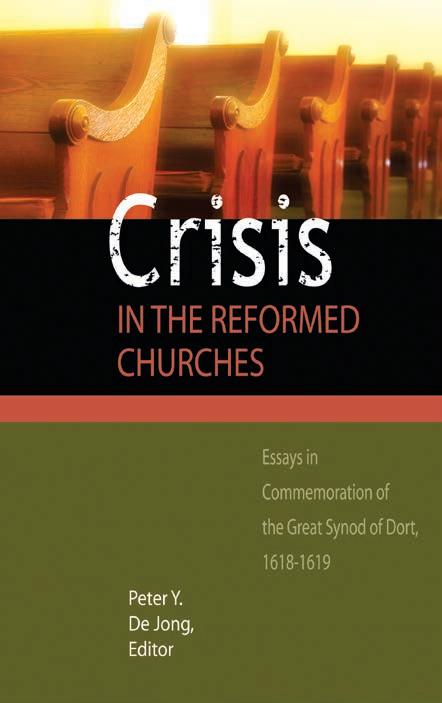
In our September/October issue, Reformed Fellowship plans a Reformation-themed forum, in which we have invited a few contributors to review particular chapters from Crisis in the Reformed Churches, connecting these chapters to more recent scholarship on the Synod of Dort and contemporary pastoral issues. We hope this sampling of Crisis in the Reformed Churches will inspire Outlook readers to pick up a copy of this important and accessible volume of Reformation history.
Subscription Policy
The Outlook (USPS 633-980) is published six times per year (bi-monthly) by Reformed Fellowship, Inc. Annual subscriptions are $30.00 per year in the United States; outside the US, $36 per year (foreign subscribers please remit payment in US Funds; Canada add GST). Digital download subscriptions are $12 annually, and are included FREE with a print subscription. Unless a definite request for discontinuance is received, it is assumed that the subscriber wishes the subscription to continue without the formality of a renewal order and he will be billed for renewal. Anyone desiring a change of address should notify the business office as early as possible in order to avoid the inconvenience of delayed delivery. Zip code should be included. Periodical postage paid at Grandville, MI and at additional mailing offices.
POSTMASTER:
Send address changes to The Outlook, 1988 140th Avenue, Dorr MI 49323
Advertising Policy
1. The Outlook cannot accept announcements or advertising copy inconsistent with the stated purpose of RFI. All advertisements and announcements must be approved by the RFI board prior to publication. We reserve the right to reject, edit, or request resubmission of announcement text or advertising copy. Books, pamphlets, or CDs to be advertised are to be screened as to author and content prior to publication of the advertisement, and such material should not conflict with the stated purpose
MI 49323, and must be received at least two months before the publication date.
3. Fees for B&W/grayscale ads: $190 for full-page, $115 for half-page, $65 for quarter-page.
4. Fees for full-color ads: $235 for full-page, $140 for half-page, $80 for quarter-page.
5. Fees for preparing artwork for ads (in addition to advertising costs above) are $140 for full-page, $115 for half-page, $90 for quarter-page. These fees are waived if advertising art is print-ready. Please submit manuscript in an email or as an MS-Word.doc attachment. If you have pictures or images, please include as JPG files.
6. Preferred final file format for print-ready ads: High Quality Print PDF.
7. Ad sizes specifications: 8.75 x 11.25, trim 8.5 x 11"

Full page non-bleed: 7.25 x 9.75"
Half page horizontal bleed: 8.625 x 5.25"
Half page horizontal non-bleed: 7.25 x 4.5"
Quarter page (non-bleed) 3.5 x 4.5"
8. This Advertising Policy supersedes all prior policies, resolutions, or other statements.
Editorial Office
Dan Van Dyke
3718 Earle S.W. Grandville, Michigan 49418
Email: djvan1951@gmail.com
Circulation Office
1988 140th Avenue, Dorr MI 49323
(616) 532-8510
Business Mailing Address
1988 140th Avenue, Dorr MI 49323
Email: office@reformedfellowship.net
Press
Release:
The Outlook | 11
Stay tuned for more details of upcoming online event(s) connected with this theme.
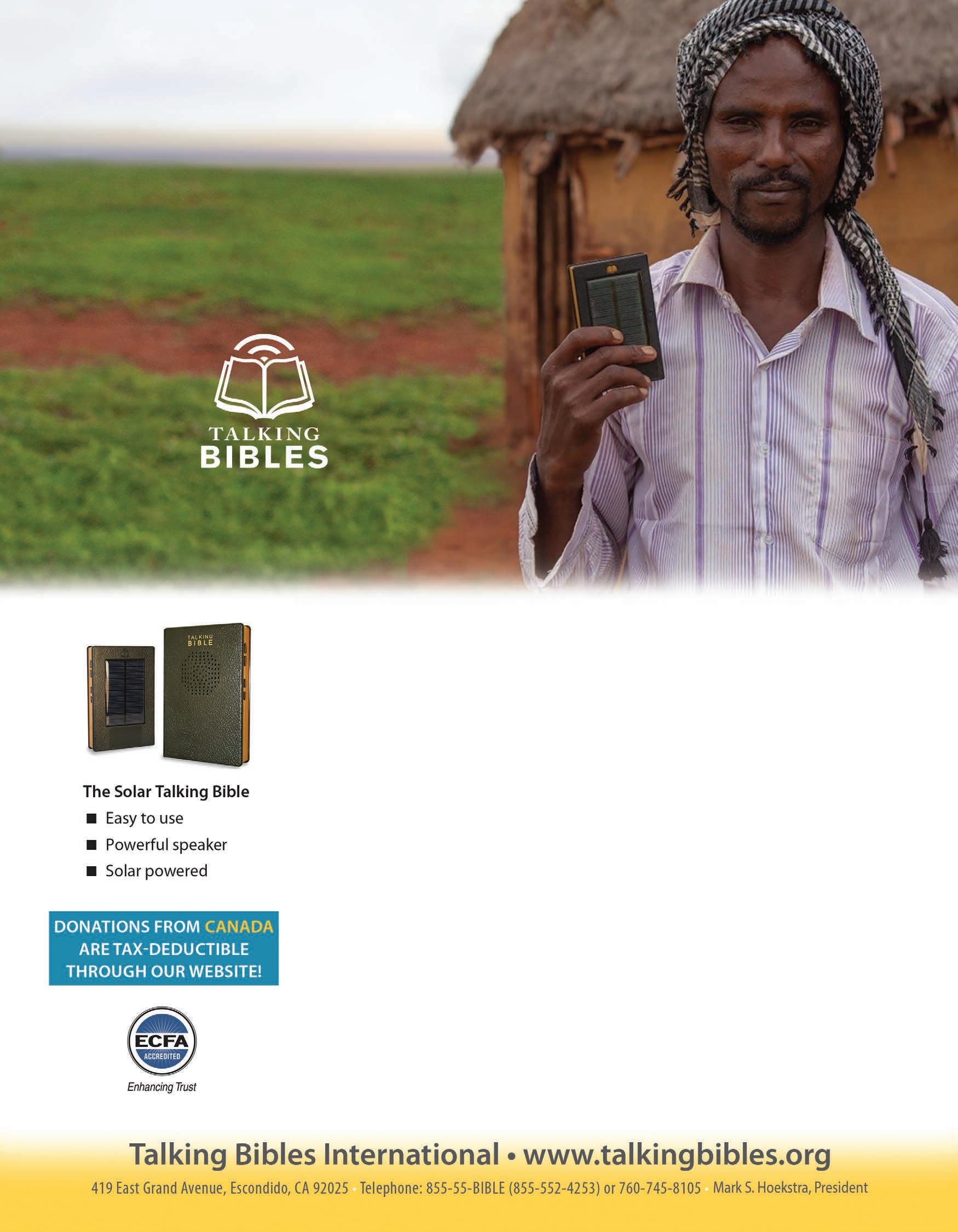

Reformed Fellowship, Inc.
1988 140th Avenue
Dorr, MI 49323
(616) 532-8510
Life in Christ
A thoughtfully developed graduated Confessional Study
Course for Grades 5 through 12
This coordinated curriculum for children and young people covers the Three Forms of Unity (The Heidelberg Catechism, The Belgic Confession, and the Canons of Dort); it also references the Westminster Confession and Catechisms.
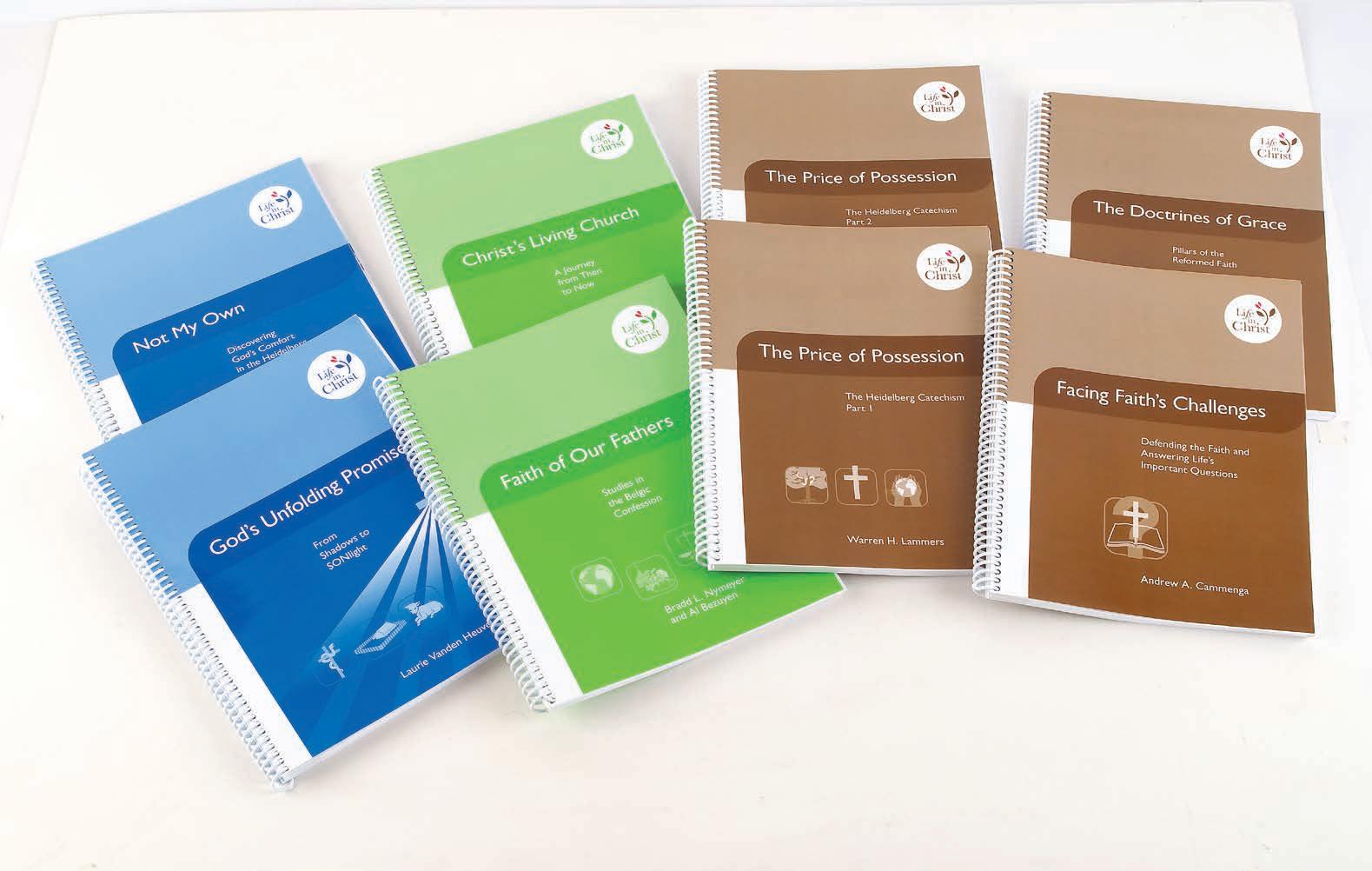
Designed to instruct young people in the precious biblical Reformed faith in a format that skillfully uses explanation, memory work from the confessions, Scripture, and questions for discussion. Each lesson includes a workbook format to answer the questions, a highlighted box of keywords and concepts, and personal application of the theme. Each volume comprises twenty-five lessons in a convenient 8-1/2” x 11” spiral-bound study guide/workbook. Teacher Tips guidelines are also available for most volumes. View sample chapters of each volume online!
Three convenient ways to order:
Online: www.reformedfellowship.net
Email: office@reformedfellowship.net
Call: 616.532.8510
Reformed Fellowship, Inc.
1988 140th Avenue
Dorr, MI 49323
Life Christ in












 Mrs. Annemarieke Ryskamp
Mrs. Annemarieke Ryskamp




 Mrs. Elisabeth Bloechl
Mrs. Elisabeth Bloechl

 Mr. Michael R. Kearney
Mr. Michael R. Kearney







